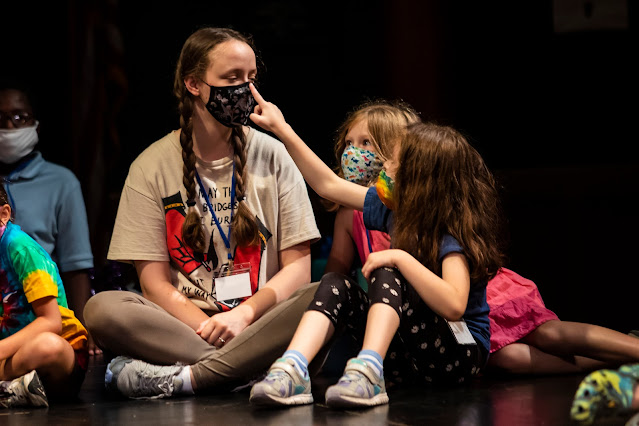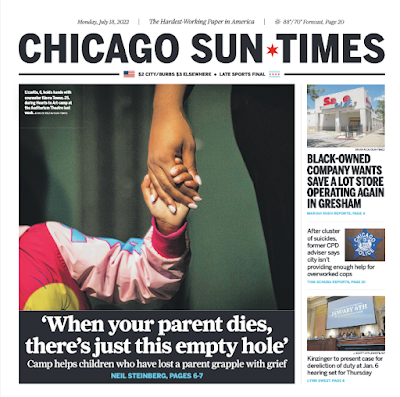 |
| "Physical touch is what made this place feel safe," says Grace Law, 24, a group leader at Hearts to Art, a camp for children who have lost a parent. (Sun-Times photo by Ashlee Rezin) |
Davion isn’t on stage with the other kids, talking, stretching, being put through their morning paces at the Vittum Theater.
Instead he’s lying on the floor by the lobby door, silent, alone, facing the wall. But that’s OK. Camp director Sarah Illiatovitch-Goldman gently coaxes the 6-year-old to his feet.
“Come with me,” she urges, “I need you with me.” She guides Davion into the auditorium. He dives into a seat, drawing his knees up against his lips, watching. In front of him on stage are three dozen kids, warming up, rolling their shoulders. From diverse backgrounds — boys, girls, at least one non-binary child, ages 6 through 10. City and suburbs. Black and white, from across the economic spectrum.
But they share one hard reality that has upended their young lives and sent them here, to Hearts to Art, a two-week summer camp for children with parents who have died.
Now in its 18th year, applications are way up. The program, mixing creative arts and counseling, is run by the Auditorium Theatre and held at the Vittum. The theater, in Chicago’s West Town neighborhood, is part of Northwestern University’s Settlement House.
“This year we had a record number,” Illiatovitch-Goldman says. “The amount of loss is bigger.”
Both in Chicago and across the country. A study in Pediatrics last year estimated one in four COVID-19 deaths — 250,000 and counting — cause a child to lose a parent or caregiver. Between illness, accident and violence, an estimated 3.5% of children in America have a parent die before the age of 18. A 2-year-old boy lost both parents in the Highland Park 4th of July shooting.
To continue reading, click here.

I am sad that such a program needs to exist, yet very happy that it does for these kids.
ReplyDeleteHeartbreaking and beautiful. It makes me want to weep that there are people who wade into such sorrow to help the least among us. Thank you for bringing this sort of window into the world into our lives on a daily basis.
ReplyDeleteKudos to CS-T for making this a front page story.
ReplyDeleteMy wife lost her father when she was ten. He was only 45. There were no camps for children who lost a parent. She did what children were expected to do when dealing with death, and the grieving process, in 1958. You put on your game face, sucked it up, and carried on. I'm sure such a program would have been greatly beneficial.
ReplyDeleteMy wifes father was murdered in a Cleveland bar 46 years ago. She has PTSD. Would that something like this was available to her back then
ReplyDeleteMy sympathies to your wife. There were no such programs in 1976, just as there were none in 1958, which was also the year of Chicago's OLA school fire. The survivors have their own website--and they are NOT shy about retelling how roughly half their classmates died.
DeleteThere was no grief counseling or therapy (especially for childhood PTSD) in 1958. The OLA survivors were literally ordered, by the Chicago archdiocese, to choke down their feelings and to NEVER talk about it to anyone, not even to one another.
As a result, there are still hundreds of OLA survivors who are the "walking wounded"...and they have tried try to ease their lifelong pain through postings on a message board. That makes for some extremely painful reading, but it may be the only therapy they've ever received.
Thanks Grizz. She was 4 years old when it happened.
ReplyDeleteMy mom was pregnant with me and could hear the sirens and smell the smoke from where we lived at ohio and Trumbull at the time of the our lady of angels tragedy
As a teen-ager, I knew a guy who had lived near OLA when he was younger. He said the smoke smelled like nothing he ever smelled before...or since. He didn't need to explain why...and I'm sure I don't, either.
Delete